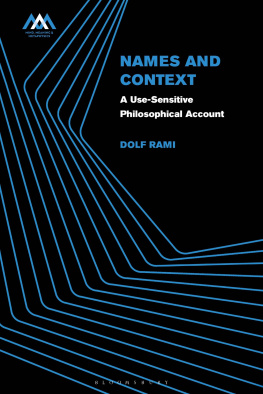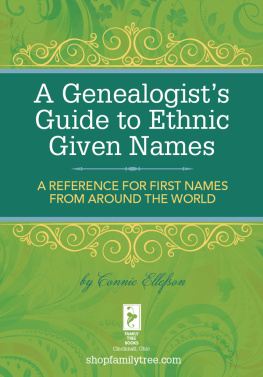
Names and Context
Everyday language is a part of the human organism and is no less complicated than it
(Ludwig Wittgenstein)
For Cordula, Florian and Pauline
To the memory of Jonathan Lowe
Mind, Meaning and Metaphysics
Series Editors:
Christopher Gauker, University of Salzburg, Austria
Mark Textor, Kings College London, UK
Johannes Brandl, University of Salzburg, Austria
Max Klbel, University of Vienna, Austria
The Mind, Meaning and Metaphysics series publishes cutting-edge research in philosophy of mind, philosophy of language, metaphysics and epistemology. The basic questions in this area are wide-ranging and complex: What is thinking and how does it manage to represent the world? How does language facilitate interpersonal cooperation and shape our thinking? What are the fundamental building blocks of reality, and how do we come to know what reality is?
These are long-standing philosophical questions but new and exciting answers continue to be invented, in part due to the input of the empirical sciences. Volumes in the series address such questions, with a view to both contemporary debates and the history of philosophy. Each volume reflects the state of the art in theoretical philosophy, but also makes a significant original contribution to it.
Editorial Board:
Annalisa Coliva, University of California, Irvine, USA
Paul Egr, Institut Jean-Nicod, France
Olav Gjelsvik, University of Oslo, Norway
Thomas Grundmann, University of Cologne, Germany
Katherine Hawley, University of St. Andrews, United Kingdom
ystein Linnebo, University of Oslo, Norway
Teresa Marques, University of Barcelona, Spain
Anna-Sophia Maurin, University of Gothenburg, Sweden
Bence Nanay, University of Antwerp, Belgium
Martine Nida-Rmelin, University of Freiburg, Switzerland
Jaroslav Peregrin, Czech Academy of Sciences, Czech Republic
Tobias Rosefeldt, Humboldt University of Berlin, Germany
Anders Schoubye, University of Edinburgh, United Kingdom
Camilla Serck-Hanssen, University of Oslo, Norway
Emily Thomas, Durham University, United Kingdom
Amie Lynn Thomasson, Dartmouth College, USA
Giuliano Torrengo, University of Milan, Italy
Barbara Vetter, Humboldt University of Berlin, Germany
Heinrich Wansing, Ruhr University of Bochum, Germany

Contents
The author and publisher gratefully acknowledge the permission granted to reproduce the copyright material in this book. Chapters 1, 3 and 5 are substantially revised and expanded versions of the following articles, with permission from Springer Nature:
Rami, D. (2019) Names and Their Kind of Rigidity, in: Erkenntnis, 84, 257282.
Rami, D. (2014) The Use-Conditional Indexical Conception of Proper Names, in: Philosophical Studies, 168, 119150.
Rami, D. (2015) The Multiple Uses of Proper Nouns, in: Erkenntnis, 80, 405432.
Chapter 2 is a revised version of Rami, D. (2016) Names, Namings and Name-Using Practices, in: Stalmaszczyk, P. and Fernandez Moreno, L. (eds), Philosophical Approaches to Proper Names, Frankfurt am Main, 5593, with permission from Peter Lang.
I would like to thank all those involved from Bloomsbury Academic for their great help, especially during the production stage of this book.
This book contains the third and most detailed of my attempts so far to develop a semantics of proper names. I developed the so-called use-sensitive view on proper names defended in this book in three different phases.
The first phase was in 2007 where I made two different attempts to figure out my own view on names. Firstly, I held a view that could be seen as a compromise between a Fregean and a Millian view of names and that assumed that proper names have quite minimal senses from an explanatory point of view. Secondly, I also presented a very sketchy contextualist predecessor version of the use-sensitive view of names contained in this book at two conferences, one in Barcelona and one in Paris.
The second phase was between 2009 and 2014. In this phase, I visited Kings College London for two years with a Feodor-Lynen-Fellowship of the Alexander-von-Humboldt Foundation. I had a lot of very good discussion partners during this phase, but the one person who probably had the most important influence on my work on names in this phase was Mark Textor. I would like to thank him for his advice and lots of fruitful and helpful discussions. In November 2014, I submitted a first version of this book as my Habilitationsschrift and it was accepted by the department of philosophy of the University of Gttingen in March 2015.
The third phase of my work on names was between 2015 and 2019. In this phase, I tried to improve and rewrite some of the chapters of my Habilitationsschrift. I also skipped some chapters that were mainly concerned with other topics than names, namely existence and quantification. Furthermore, I also added a new chapter on anaphoric uses of proper names. Hence, here we are with some new twists and fine-tuning in 2020.
The development of ones own philosophical views and thoughts essentially depends on the interaction with other philosophers who are interested in the same philosophical topics and problems. As far as I can remember, and certainly at present I cannot remember every discussion on names that I have had since 2007, I benefited significantly from discussions with Stephen Barker, Laura Delgado, Stacie Friend, Christopher Hughes, Hans Kamp, Tobias Klauk, Wilfried Keller, Ruth Kempson, Jan Kpping, Shalom Lappin, Jonathan Lowe, Genoveva Marti, Wilfried Meyer-Viol, Eliot Michaelson, Edgar Onea, David Papineau, Stefano Predelli, Graham Priest, Brian Rabern, Francois Recanati, Peter Ridley, Louis DeRosset, Mark Sainsbury, Wolfgang Spohn, Peter Sutton, Alberto Voltolini, Timothy Williamson, Elia Zardini, Thomas Ede Zimmermann and Sarah Zobel. I also would like to thank the following people, either for their support, help, corrections or discussions: Christian Beyer, Adrian Bruhns, James Conant, Anthony Everett, Giulia Felappi, Manuel Garca-Carpintero, Aidan Gray, Daniel Gutzmann, Volker Halbach, Bruno Haas, Robin Jeshion, Max Klbel, Tilmann Kppe, Wolfgang Knne, Gail Leckie, Ora Matushansky, Felix Mhlhlzer, Peter Pagin, Benjamin Schnieder, Julian Small, Markus Steinbach, Jan Sthring, Sarah Tropper, Lee Walters, Heinrich Wansing, and Jennifer Wright. I would like to thank them all for their interest in my work and their helpful comments or objections.
Special thanks go to my friends Sarah Zobel and Jan Kpping, who always had time to give me their feedback on my philosophical and linguistic views.
Finally, I would like to thank two anonymous reviewers for their comments and suggestions.
Gttingen, January 2021
A very brief history of the philosophical debate on names in the analytic tradition
description theories of names became the widely accepted orthodoxy until the latter part of the twentieth century.
In early 1970s, description theories of names were famously attacked by direct reference theory of names. During the last few decades, this view on names became the
Next page














